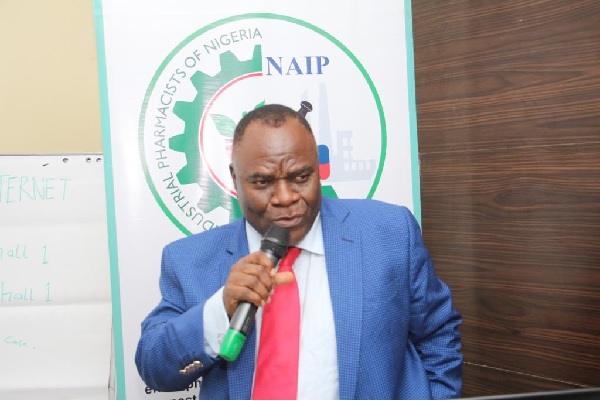
The Chief Executive Officer, Oculus Pharmacare Limited, Pharm. (Sir) Valentine Ezeiru, has urged stakeholders in the Nigerian pharmaceutical industry to collaborate toward the production of Active Pharmaceutical Ingredients (API) and contract manufacturing, saying such moves will help to achieve drug security and self-sufficiency in the country.
Ezeiru made the call at the recent CEOs’ Forum of the Association of Industrial Pharmacists of Nigeria (NAIP), held in Lagos, saying Nigeria needs a strong policy framework to be able to start producing API and exploring local contract drug manufacturing.
Presenting a keynote address at the forum titled, “Promoting self-sufficiency and drug security through local contract manufacturing and API manufacturing: Lesson learned from COVID-19”, Ezeiru stated that promoting and encouraging self-sufficiency and drug security through local contract and API manufacturing is a task that all industry stakeholders must collaborate to achieve.
According to him, self-sufficiency is an instance of needing no outside aid or help in satisfying one’s basic needs, especially with regard to the production of foods or medicines. He explained that drug security is a measure put in place to ensure that quality, safe and efficacious medicines are produced by facilities that meet the right standards and, that the integrity of such medicines is not compromised during distribution along the supply chain.
On the concept of contract manufacturing, Ezeiru said, “When it comes to manufacturing, not every company has resources, capacity or time to do it all effectively. Just as many businesses choose to outsource accounting or IT management, so do many companies outsource their manufacturing needs to a firm that can provide a more efficient production run, a faster turnaround, improved quality, and better scalability, among a host of other things. This is called contract manufacturing.”
He noted that many challenges have slowed down drug manufacturing in Nigeria, stating that most of the raw materials needed for the production are imported because Nigeria does not have a strong petrochemical industry that should produce resins and excipients, including coloring agents, preservatives, and fillers, among others.
Quoting the Manufacturers Association of Nigeria (MAN), the Oculus boss pointed out that the industry’s capacity utilization is barely 47 percent, adding that only a few players are really healthy.
He stressed that with the various challenges facing pharmaceutical manufacturing in the country, local contract and API manufacturing have become a tall order for Nigerian pharmaceutical manufacturers.
He noted that the supply prices the companies are offering are important, especially, if the same companies are also producing generic varieties of the drug to be manufactured under contract manufacturing.
Ezeiru however pointed out that attaining self-sufficiency and drug security through local contract and API manufacturing can only be possible when there is a solid policy framework to guide such. He added that an enabling business environment must also be created by the government to promote, protect and grow the industry.
According to him, developing local capacity for the manufacturing of Active Pharmaceutical Ingredients is vital, insisting that the availability of API remains crucial to the transformation of the pharmaceutical manufacturing sector of Nigeria.
The keynote speaker expressed optimism that the establishment of the Dangote Petrochemicals industry, which is expected to become operational when the Dangote Refinery commenced operations, will be a huge boost to pharmaceutical products manufacturing in Nigeria.
He however emphasized that the Nigerian pharmaceutical industry needs more than the Dangote Petrochemicals industry, adding that about five petrochemical industries are needed to satisfy the needs of drug manufacturers in the country.
Noting that API manufacturing is a capital-intensive venture, Ezeiru said only a strong policy framework can attract investment, adding that investors must also be given a time period to recoup their investments.










